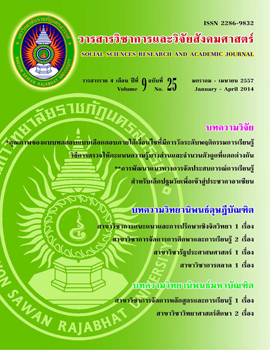ผลการสอนแบบโฟร์แมท ที่มีต่อผลสัมฤทธิ์ทางการเรียนวิชาวิทยาศาสตร์ และเจตคติต่อวิชาวิทยาศาสตร์ของนักเรียนชั้นมัธยมศึกษาปีที่ 1
Main Article Content
Abstract
บทคัดย่อ
การวิจัยในครั้งนี้มีวัตถุประสงค์ดังนี้ 1) เพื่อเปรียบเทียบผลสัมฤทธิ์ทางการเรียนวิชาวิทยาศาสตร์ก่อนและหลังเรียนของนักเรียนที่ได้รับการสอนโดยใช้การสอนแบบโฟร์แมท 2) เพื่อศึกษาจำนวนนักเรียนที่มีคะแนนผ่านเกณฑ์ร้อยละ 70 ของคะแนนเต็ม และ 3) เพื่อเปรียบเทียบเจตคติต่อวิชาวิทยาศาสตร์ก่อนและหลังเรียนของนักเรียนที่ได้รับการสอนโดยใช้การสอนแบบโฟร์แมท กลุ่มตัวอย่างที่ใช้ในการวิจัยเป็นนักเรียนชั้นมัธยมศึกษา ปีที่ 1 ที่กำลังเรียนในภาคเรียนที่ 1 ปีการศึกษา 2555 โรงเรียนท่าตะโกพิทยาคม จังหวัดนครสวรรค์ จำนวน 1 ห้องเรียน 34 คน ได้มาจากการสุ่มแบบกลุ่ม เครื่องมือที่ใช้ในการวิจัย มีดังนี้ 1) แผนการสอนแบบโฟร์แมท จำนวน 3 แผน ซึ่งผ่านการตรวจสอบคุณภาพโดยผู้เชี่ยวชาญได้ค่าเฉลี่ยอยู่ในระดับเหมาะสมมาก 2) แบบทดสอบวัดผลสัมฤทธิ์ทางการเรียนวิชาวิทยาศาสตร์ ที่มีค่าความยากง่ายระหว่าง 0.43 - 0.73 และค่าอำนาจจำแนกเท่ากับ 0.25 - 0.65 ตามลำดับ มีค่าความเที่ยงเท่ากับ 0.75 และ 3) แบบวัดเจตคติต่อวิชาวิทยาศาสตร์ มีค่าอำนาจจำแนกรายข้อ เท่ากับ 1.79 - 26 และค่าความเที่ยงเท่ากับ 0.59
ผลการวิจัยพบว่า
1. นักเรียนที่ได้รับการสอนแบบโฟร์แมท มีผลสัมฤทธิ์ทางการเรียนวิชาวิทยาศาสตร์หลังเรียนสูงกว่าก่อนเรียน อย่างมีนัยสำคัญทางสถิติที่ระดับ .05
2. นักเรียนที่ได้รับการสอนแบบโฟร์แมท ร้อยละ 82.86 ของนักเรียนทั้งหมด มีคะแนนผ่านเกณฑ์ร้อยละ 70 ของคะแนนเต็ม อย่างมีนัยสำคัญทางสถิติที่ระดับ .05
3. นักเรียนที่ได้รับการสอนแบบโฟร์แมท มีเจตคติต่อวิชาวิทยาศาสตร์หลังเรียนสูงกว่าก่อนเรียนอย่างมีนัยสำคัญทางสถิติที่ระดับ .05
Abstract
The purposes of this research were 1) to compare the achievement of Mathayomsuksa I students before and after being taught science using the 4 MAT, 2) to study the number of students in Mathayom 1 who achieved the achievement of 70% and 3) to compare attitude toward Science subject of Mathayom 1 students before and after being taught science using the 4 MAT. The samples were Mathayom 1 students studying in the first semester of 2012 academic year at Thatakophitayakom School in Nakhon Sawan. The samples were selected using multistage sampling. The research instruments were 3 lesson plans using the 4 MAT, with a good appropriation level (= 4.23), The achievement test with the degree of difficulties and discriminations was at 0.43-0.73 and 0.25-0.65 respectively with the reliability value of 0.75. The attitude toward science subject with the degree of discriminations between 1.79-26 with the reliability value of 0.59.
The research findings were as follows:
1. Students taught science using the 4 MAT achieved a higher score in the posttest at the .05 level of significance.2. 82.86 % of students who were taught science using the 4 MAT achieved 70 % criteria score of the posttest at the .05 level of significance.
3. The students’ attitude toward the science subject taught using the 4 MAT after being taught was higher than that before being taught at the .05 level of significance.


